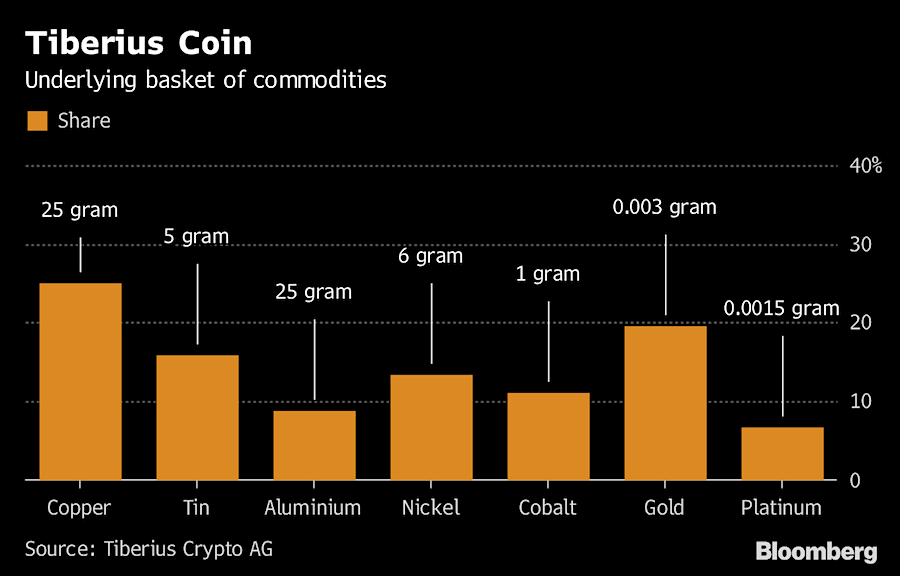Tiberius tests its metals in crypto backed by copper, gold
Swiss asset manager and commodities trader Tiberius Group AG is stepping into the $215 billion digital coin market by offering a new token backed by seven metals in a sale set for Oct. 1.
Aiming to distinguish its Tiberius Coin from the thousands that have no reference value, the company plans to make a market in the asset so that its value holds close to that of a price of a basket of copper, aluminum, nickel, cobalt, tin, gold and platinum.
Christoph Eibl's 13-year-old investment company will enter a cryptocurrency panorama littered with failed projects giving assurances to buyers their coin's value derives from more than just quasi-anonymity, a single reference asset like gold or a promise to not let issuance run wild.
Company will use blockchain technology to account for trades and aims to offer investors the option to use its coin as a digital currency.The effort is led by the company's Tiberius Technology Ventures AG arm in Baar, Switzerland, a nation that's cutting one of the world's more liberal profiles for embracing privately issued money.
"Instead of underlying the digital currency with only one commodity, we have chosen a mix of technology metals, stability metals and electric vehicle metals," the unit's Chief Executive Officer Giuseppe Rapallo said in an interview. "This will give the coin diversification, making it more stable and attractive for investors."
he new coin will be offered at about $0.70 and will be sold under Swiss law, instead of as an unregulated initial coin offering, or ICO. The supply will be purely based on demand and only be limited by the availability of the underlying metals, Rapallo said.
Estonian Exchange
The company will list the coin on the Estonia-based LATOKEN exchange, chosen because it fulfills the necessary regulatory standards, Rapallo said.
Tiberius Group, founded in 2005 by Eibl, trades physical commodities and manages about $350 million for clients. Tiberius Technology Ventures' Chief Scientist and Security Officer Philip Zimmermann is known for being the creator of Pretty Good Privacy or PGP, a widely used email encryption software.
Tiberius Coin will use blockchain technology to account for trades and aims to offer investors the option to use it as a digital currency, paying for a coffee or pair of trousers, for example, with a few grams of metal, simulating a traditional barter.


Gold has been used to back certificates, tokens and other medium with varying degrees of success. In the early days of the Internet, E-Gold, founded in 1995, was used by millions until it was shut down. With Bitcoin as the forerunner of digital currencies and the blockchain technology offering a decentralized accounting method, new commodity-backed coins like Golden Currency and GoldFinX saw the light of day, with mixed results.
"There are dozens of firms who launched stablecoins linked to metals, and so far none of them have gained any traction," said Adrian Ash, the research director at London-based BullionVault Ltd, which has since 2005 offered trading of vaulted metal to 70,000 clients around the world who transact peer-to-peer on an online platform without the use of a blockchain - the company stores $1.5 billion worth of gold.
"They're trying to solve a problem that doesn't exist - all of this can be achieved without the additional cost of a distributed ledger," Ash said.
At a relatively stiff price, holders can swap the cryptocurrency for physical commodities. If successful, it might provide traders or procurement departments of industrial companies a new way to buy and sell physical metals in the long-term.
Given that most commodities trade in tons rather than grams, Tiberius asks for a minimum fee of $10,000 for swapping the coin into the physical raw materials.